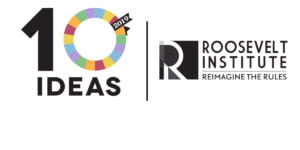2019 10 Ideas Submission – Reformation of Singapore’s Special Education
Memo proposal submitted to the Roosevelt 10 Ideas Journal. Written by the Equal Justice & Human Rights Policy Centre, Roosevelt Institute @ Yale-NUS College.
Reform of Singapore’s Special Education
To alleviate workplace segregation of the intellectually disabled in Singapore, the Singapore Ministry of Education (MOE) and Ministry of Social and Family Development (MSF) should increase the standards and accessibility of supplementary vocational opportunities offered to the intellectually disabled, such as internships, specialised trainings and mentorships.
Key Facts
- Persons with disabilities (PWDs) form only 0.1% of the private sector workforce.
- Over 60% of PWDs surveyed in 2016 by the NCSS reported that they were not included in the workplace or that they were not given opportunities for professional development.
- In 2016, 62% of PWDs surveyed report that they do not feel included, accepted, or given opportunities to contribute or reach their potential by society.
Background and Analysis
The PWD community is a highly marginalised group within Singapore’s employment procedure. A survey conducted in 2016 revealed that over 60% of PWDs felt that they were not assimilated into the workplace and that there were no opportunities to develop professionally in a manner that would allow them to effectively contribute to society. Currently, intellectually disabled people are limited to school-to-work vocational programmes that cater to the service sector, usually in the food, beverage, or hospitality industry. Consequently, PWDs form merely 0.1% of the private sector workforce.
For the state, a lack of diversified employment opportunities signifies a loss of human resources and potential. In a study, 250 Australian corporations surveyed found a net positive value in hiring PWDs. 32.2% of the corporations stated that creative and different skills had been brought to the workplace on account of hiring PWDs and 23.7% declared that the process improved workplace morale. Notably, none of the corporations surveyed stated that PWDs decreased their overall productivity and financial success.
This demonstrates how better efforts to integrate PWDs within Singaporean society will unlock human resources and capital in various sectors, allowing Singapore to reach greater economic and productive potential. Currently, initiatives that directly target employers through incentives have proven to be ineffectual. This necessitates a bottom-up approach that involves targeting students in special education (SPED) by reforming the current vocational program. Through this policy change, the state will normalise inclusive hiring policies, de-stigmatise the engagement of PWDs in society, and ultimately promote social cohesion. Most importantly, the state no longer neglects the fundamental rights of PWDs to thrive within all sectors of our society.
Talking points
Problem:
Structural segregation of intellectually disabled individuals results in employment opportunities being limited largely to the service sector. This represents a loss of potential human resources in other sectors and a failure of the state to provide equal opportunities to the disadvantaged.
Solutions:
Revising the current vocational programme to match the standards of mainstream tertiary education will increase opportunities for special education (SPED) students to explore work in various sectors. These standards can be met through implementing opportunities such as local exchange programs, workshops, internships and networking opportunities with employers.
Impact:
A systemic increase in training and workplace exposure in various industries will have a two-fold effect; allowing for greater workforce participation of persons with disabilities (PWDs) and de-stigmatising the engagement of PWDs in society. Consequently, this will prompt the normalisation of inclusive hiring policies. This will unlock human capital in various sectors, strengthening Singapore’s economic productivity.
Policy Idea:
In order to reform the vocational school-to-work programmes offered in Special Education (SPED) schools for students with Autism Spectrum Disorder, the Ministry of Education (MOE) should (1) coordinate with other tertiary education institutes such as Polytechnics and Institutes of Technical Education (ITE) to create an adapted exchange programme, (2) collaborate with businesses in various industries to produce specialised internship programmes, and (3) organise networking sessions to create a space for interactions between employers and SPED students.
Policy Analysis:
Given that SPED students are pigeon-holed into the hospitality sectors upon completion of their education, this policy aims at optimising the abilities of SPED students and creating more diverse career options. By establishing direct links with other sectors, this policy creates equal opportunities for SPED students to be exposed to different fields of interest.
The programme prepares PWDs to work across various sectors by equipping them with the necessary skills, knowledge and experience. Exchange programmes with a local polytechnic or Institute of Technical Education will educate SPED students in the foundations of a specific field of interest. After knowledge acquisition in the local exchange programmes, internships and networking opportunities will offer SPED students the opportunity to employ their knowledge and gain relevant work experience and skills.
To adapt to the learning curves and needs of SPED students, the academic rigour of local exchange programs can be lowered, with fewer standardised tests and gentler assessment rubrics. These adjustments place more emphasis on learning catered to the individual pace of SPED students. Internships can also be modified; the initial month can be dedicated to job-shadowing to ease the transition from school to work. Following this, SPED students can report to a manager daily on their progress at work.
The educational reform will strengthen the competitiveness of SPED students’ job applications. Employers will be more inclined to change their hiring policies when SPED students gain the capabilities to match the job. Furthermore, cross interactions between SPED students, mainstream students and employees will reassure employers that PWDs can integrate smoothly into the workplace. This complements current efforts made by the Government to incentivise employers to adopt inclusive hiring policies and create an inclusive workplace environment.
Since the school is a microcosm of the larger society, the inclusion of SPED students will normalise the participation of PWDs in the workforce. When the government treats SPED students with the same integrity as they do for students in mainstream education, the private sector will reciprocate and place their trust in the abilities of PWDs. Education reform is the start of a change in societal mindset that will ultimately sway employers to employ inclusive hiring policies.
Possible Objections:
Our policy may face objections from parents/guardians of PWDs as well as the educators. One may challenge the purpose of making special need education more mainstream since it exists to serve the different needs of PWDS. There may also be doubts on the receptiveness of SPED students to the educational reform.
Next Steps
The Ministry of Education, in collaboration with SPED Schools and tertiary educational institutes, should work on drafting a reformed curriculum to replace the current school-to-work vocational program that will better serve the diverse interests of SPED Students. Both businesses and PWDs will benefit from an educational reform that includes local exchange programmes, internships and networking opportunities. A limited education pathway must be reformed to provide equal opportunities to PWDs to achieve their full potential.
Image Credit: Lauren Mancke/Unsplash



 https://www.straitstimes.com/singapore/environment/in-pictures-10-most-common-birds-in-singapore
https://www.straitstimes.com/singapore/environment/in-pictures-10-most-common-birds-in-singapore Alamy
Alamy
Leave a Reply
Want to join the discussion?Feel free to contribute!